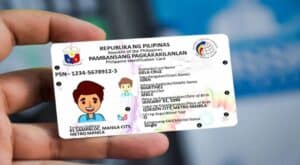One of the three elements of the Philippine Identification System is the Philippine National ID (more on this later). It is a legal document that the Philippine government has issued and can be used in regular transactions.
The objective is to create a universal ID that can be used to obtain social welfare and government benefits as well as to apply for various services and meet eligibility requirements (both public and private).
You can use it to register to vote, open a bank account, apply for other IDs (like a passport, driver’s license, NBI, etc.), present it for work requirements and tax-related activities, enter government hospitals and schools, and more.
Please Read: How Can You Get a UMID ID?
What is the PhilSys Act or Philippine Identification System Act?
The Philippine Identification System was established by the PhilSys Act, also known as Republic Act 11055, which was signed into law in August 2018. It was developed to give residents, both Filipino and foreign, a solitary, uniform evidence of identity to facilitate both public and private transactions.
It also aims to serve as a deterrence to illegal behavior.
Three parts make up the Philippine Identification System:
- Each person (citizen or alien) will receive a randomly generated, special, and permanent identity number at birth or upon registration via the PSA (based on the rules and provisions set on the Implementing Rules & Regulations of the PhilSys Act). All government organizations, including enterprises under government control, will accept and use the PSN. Nobody may own more than one PSN. Additionally, it cannot be chosen and cannot be pre-determined or allocated to anyone; it will only be generated upon registration or birth.
- The PhilSys Registry is a database that houses the PSN, along with all registration records, histories, and associated data for every user who has ever registered with the PSN.
- According to the PSA’s rules, the Philippine National ID (Phil ID), a non-transferrable card, must be given to every qualified person registered in PhilSys.
Who is qualified to receive a National ID?
No matter where they reside (OFWs and dual citizens), all Filipino citizens are eligible to apply for the Philippine National ID.
Foreign nationals who are currently residing in the nation are also qualified.
What kinds of personal data or information are stored in the PhilID?
The following details are included on the Philippine National ID:
- PhilSys Number
- Full Name
- Gender
- Blood Type
- Date of Birth
- Place of Birth
- Biometrics data (full fingerprint and iris scan)
- Photograph
- Address
- Citizenship (Filipino or Resident Foreigner)
- Marital Status (optional)
- Mobile Number (optional)
- Email address (optional)
The purchase of the registration kits for this year has been finished, according to the Philippine Statistics Authority (2019).
The Automated Biometric Identification System (ABIS), System Integrator (SI), establishment of registration centers, and card creation are the following steps on the schedule (in partnership with the Bangko Sentral ng Pilipinas).
A limited number of people are still able to register for the pilot test, which will last through June 2020. By May 2020, the PSA hopes to test the entire end-to-end registration procedure (from registration to issue). The next month, they intend to make it accessible to everyone (June 2020).
The Data Privacy Act of 2012, as well as the PhilSys Act, both impose stringent regulations on the many ways that data that will be kept in the PhilSys registry can be exchanged and accessed. The government also intends to carry out a Privacy Impact Assessment (PIA) to identify any possible systemic vulnerabilities through the Vulnerability Assessment and Penetration Testing (VAPT) stage.
The Philippine National ID costs nothing.
Absolutely. Filipinos who want a PhilID can get one without paying anything. For the transfer of damaged or misplaced IDs, you must pay.
What advantages can National IDs offer?
A widely respected ID will enable simple transactions in both private and official situations.
It eliminates the trouble of needing to produce numerous IDs or personal documents.
Additionally, the use of biometrics to verify the legality and authenticity of each person’s identity may serve as a deterrent to possible crimes. Since their identity is known, those who are asked to show their National ID are less likely to commit a crime.
One illustration that comes to me is this:
Imagine you’re looking to purchase an old laptop through Facebook Marketplace.
You agreed to meet up and complete the transaction with the seller after sending a PM of inquiry to them. “Sir, may I have a National ID now? “, I inquire. He says, “Oo naman po, eto,” and then proceeds to display his ID.
The ID serves as a security safeguard in this case by revealing the seller’s real identity.
You won’t have much issue getting in touch if you need to return the item or replace a defective device. Even though it’s not a perfect solution, it does give transactions an additional layer of protection.
Additionally, it works the other way around. Before letting you make a purchase or utilize a service, retailers or businesses may request that you provide your National ID as part of a security process (a car rental service, for example).
In my opinion, it not only serves as evidence of a person’s identity but also acts as a deterrent by making it less likely that someone will commit crimes because their identity is known.
One of the main concerns that the National ID system seeks to address is enhancing financial inclusion in the Philippines.
The government anticipates that more people would be able to apply for financial items (including loans, credit cards, life insurance, etc.) and open bank accounts once every Pinoy possesses a globally recognized form of identification.
What functions does the Philippine National ID serve?
We now understand the advantages, but what about the real-world situations in which the Philippine ID can be applied?
Here are a few of the most typical applications for it.
- Can be used as a legal document and identification verification to access government benefits and social services.
- Can be used as a legitimate document and identification verification when applying for a passport and travel visa.
- Can be used to apply for services and benefits offered by several government organizations, including PhilHealth, GSIS, SSS, PagIBIG (HDMF), and others.
- Can serve as a legal document and identity verification for registering voters.
- Can serve as a legal document and identity evidence when applying for a driver’s license.
- Can serve as a legitimate document and identification verification for a variety of tax needs and transactions.
- Can be used as a legal document and identity evidence to access government-run medical facilities and services.
- Can be used as a legitimate form of identification needed for government transactions.
- Can be used to apply to public and private schools, universities, learning centers, and other comparable organizations as a valid document and identity verification.
- can be used as a legitimate document and identification verification while applying for a job.
- Can be used to open financial accounts and carry out financial activities as a legitimate document and identity verification.





